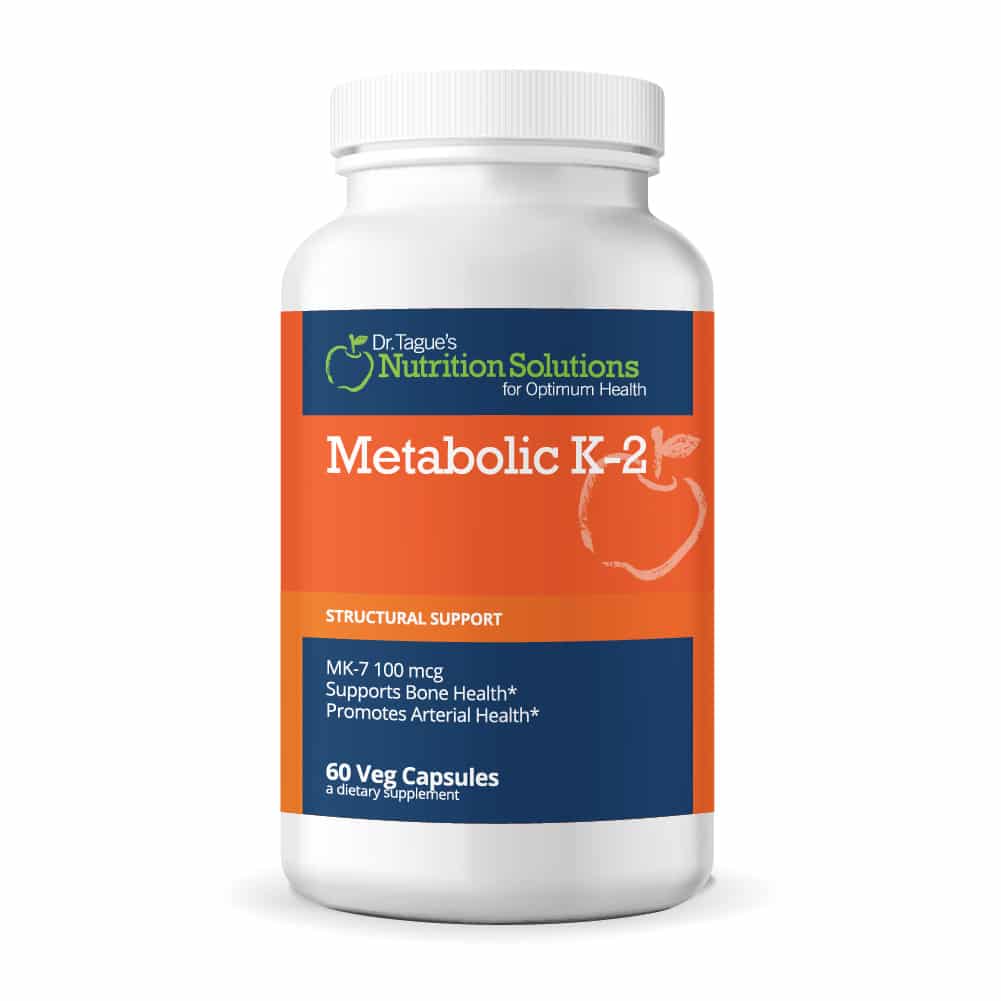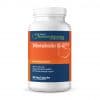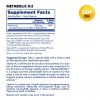Metabolic K-2 (Vitamin K2 – Menaquinone MK-7) at a glance*
- Moves calcium out of blood and puts it in bone where it belongs
- Protects against blood vessel calcification (hard arteries)
- Supports bone strength and density
- Lowers high blood calcium levels
- Important for bone and blood vessel health
- Associated with lower cancer risks
Metabolic K-2
(Vitamin K-2, Menaquinone or MK-7)
Vitamin K helps blood to clot, but it also has other important functions, including that it helps regulate calcium deposits in tissue. This is important to help prevent heart disease, stroke, calcium deposits in arteries, chronic kidney disease and to avoid osteoporosis.
Know the Difference: K-1 or K-2?
When speaking of vitamin K, you may think “the vitamin in green leafy vegetables”. Yes, that is vitamin K1. Vitamin K2 is the preferred version for best health and is highest in certain fermented foods.
Blood Vessel Health
Research is showing intake of vitamin K2 is associated with a lower risk of coronary heart disease and a significant reduction in heart attack events. One 2001 study by Vermeer et al in the Journal of Bone Mineral Metab, reported: “arteries with atherosclerotic plaques were found to have a 20-50 fold lower vitamin K2 concentration than arteries without plaque in the same human body, suggesting that vitamin K2 protects against calcification” A higher intake of menaquinone (vit. K2) is required for healthy functioning of bone and blood vessel walls. Insufficient levels of K2 can lead to increased calcium deposits, coronary artery calcification, and heart attacks. In fact, in the Rotterdam Heart Study, rates of heart disease death were 57% lower in those with the highest K2 intake.
Osteoporosis Prevention with K2
The Nurse’s Health Study of 72,000 nurses showed that women consuming at least 250 mcg of vitamin K2 per day had a 65% lower risk of hip fractures compared with those consuming 56 mcg per day. Vitamin K2, in higher amounts, consumed for at least 6 months, reduced the risk of spine fractures by 60%, hip fractures by 77% and all non-spine fractures by an astounding 81%.
Cancer Reduction
A multi-year population study showed that people who consumed larger amounts of foods (such as cheese) known to contain vitamin K2 (menaquinone) had a statistically lower risk of dying from cancer! In one study of over 11,000 men, there was a 63% lower risk of advanced prostate cancer in just 8.6 years of study.
The Right Form: “MK-4” versus “MK-7”
There are two main forms of vitamin K2 sold as supplements: MK-4 and MK-7. MK-4 is mainly marketed for bone density health, and does not benefit the cardiovascular system to the extent that MK-7 does. MK-7 is the most expensive because it is the best. It lingers in the body longer, allowing for optimal absorption and effect, hence its longer “half-life”. The best MK-7 supplements will be sourced from high-quality natto. Consuming 100 micrograms of the MK-7 form of vitamin K2 may in itself provide optimal systemic vitamin K saturation, although some studies indicate benefits for a total of up to 250 mcg per day. Most adults achieve at least 50 mcg from their diet daily. It may be recommended for you to take a 100 mcg capsule twice daily to assure optimal intake. And a healthy diet always helps! There is no known toxicity of K2 in recommended doses. Do not take K2 if you are on Coumadin.
Dosage Recommendations
Suggested Usage: Take 1 capsule daily with a meal or take as directed by your healthcare provider.
Precautions & Safety
Consult physician if pregnant/nursing, taking medication (especially anti-coagulant drugs such as warfarin, Coumadin®, heparin), or have a medical condition.
For adults only. Keep out of reach of children.
Natural color variation may occur in this product.
Nutr, Metab and CD, vol 19, 2009, Alternative Medicine Review, vol 14
2009, Advanced Nutrition and Human Metab. 5th ed, 2005, Maturitas, vol 67
2010, ConsumerLab.com, LLC, 2012, Am J Kidney Dis, vol 58, 2011






